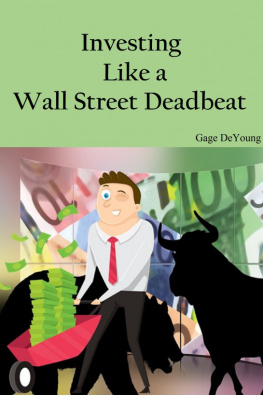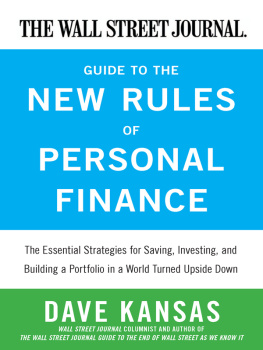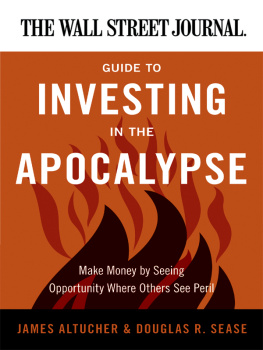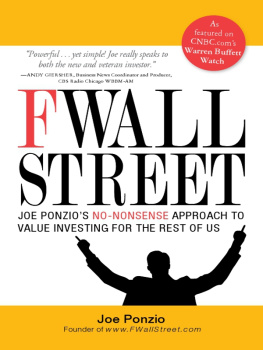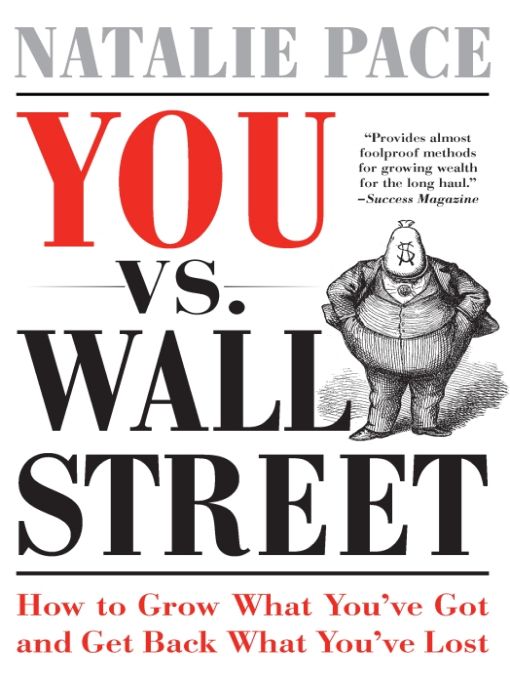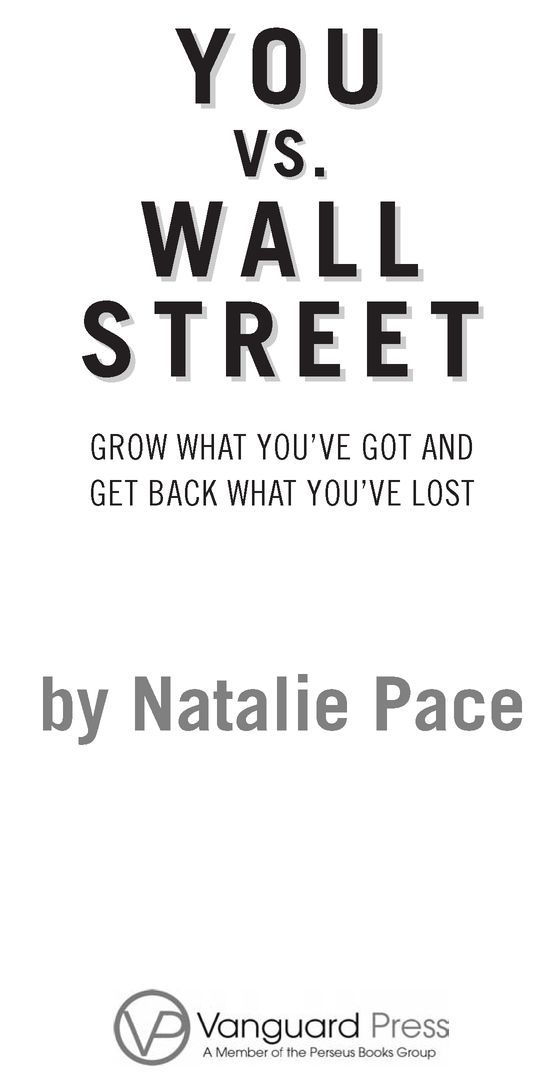Table of Contents
For Christy, Davis and Laurel and for Arynne Simon
PREFACE: AN ENTHUSIASTIC RECOMMENDATION FROM A NOBEL LAUREATE
by Dr. Gary S. Becker, Winner of the 1992 Nobel Prize in Economics
Natalie Pace thinks of investing as fun, and I tend to agree, as long as the amounts that people use in their trading are small enough that no great reduction in their standard of living would be required if much of the traded assets were lost. The challenge, especially to inexperienced investors, is to avoid getting carried away by some initial success into believing that you can continue to outsmart the market. Natalie offers good advice that would help to combat such excessive optimism.
Her excellent advice about how to allocate ones monthly budget with her Buy My Own Island Plan is an important component of achieving economic security and wealth at older ages. She also advocates considerable amounts to be set aside for basic needs, education, charities and fun things to do. This may seem obvious, but many people, including educated men and women, need help in making such basic allocations of their resources. They often get into trouble when they neglect to follow simple and fundamental rules of the type provided in this book.
I have known Natalie Pace for several years, and I have read a considerable amount of what she has written in that time. I have always found her sensible, enthusiastic and insightful. All these qualities come through in this book. This is why I recommend it with enthusiasm.
FOREWORD: BECOMING A CONSCIOUS CONDUIT OF FINANCIAL ENERGY
by Michael Bernard Beckwith, Founder and Spiritual Director, Agape International Spiritual Center, Los Angeles, California
The fact that money is a sensitive subject in Western culture is often first learned in childhood. Perhaps, like me, you can recall your parents etiquette training about not asking family membersor anyone for that matterhow much money they make or how much they paid for something. It makes you wonder how money escaped being added to the official list of what not to discuss in polite company, along with politics, sex and religion.
Obviously, theres a lot of mental and emotional energy around the topic of money in general and ones own money in particular. Money itself is a neutral energy resource, an energy symbol of supply. Our ability to magnetize the flow of money and financial resources into our lives is beginning to be understood as a multi-dimensional activity, and Natalie Pace does an excellent service to her readers through her integral approach to investment management. Her Three-Ingredient Investment Recipe offers a success strategy that includes generous portions of knowledge, wisdom, intention-setting, integrity, confidence, courage and a spirit of generosityqualities that are essential not only to making money, but to appreciating and multiplying it abundantly. Approaching money with these qualitiesnot magical thinking or other gimmicksis the key to your becoming a conscious conduit of financial energy.
Equally important, Natalie invites her readers to consider a holistic definition of wealth, beginning with an understanding that the criteria for measuring wealth is not merely ones bank balance, but also ones state of inner happiness, health, creativity and contentment. A life like this, she wisely points out, increases in value every single day and becomes more valuable not just to you but to those around you as well. Money is not just about more for its own sake. Stabilization of our financial life-structure offers us the freedom to explore the wonders of life on our planet; to express our talents, skills and gifts; to be of service in philanthropic causes; to have time to discover the deeper meaning of our lifes purpose.
A powerful metaphysical principle that Natalie emphasizes is that in order to have the energy-qualities of money work on your behalf you must first uncover your perceptions and beliefs about money and how they determine your overall relationship to your financial life. Her empowering and practical exercises for defining and shifting these beliefs impact not only how you think about money, but life itself. Natalie has synthesized practical and metaphysical techniques that will introduce you to your inner economist and thereby increase your confidence, expand your knowledge and skillfully manage your financial resources. You will find it an interesting discovery to realize how money is a mirror that reflects your relationship to many other aspects of your life.
Natalie takes the mystery and confusion out of personal finance and liberates you from the myth that Wall Street smarts are the monopoly of professional brokers. Whether your current financial means are modest or substantial, her time-tested, hands-on, interactive and intuitive methods of successful investing will assist you in dissolving your money obstacles. So prepare yourself to receive in-depth insights and practical advice that will lead you to financial wholeness. The very fact that you have purchased this book is already an investment in establishing your financial future, one that will pay rich dividends. May its humanely deep understanding be your guide to both inner and outer wealth.
PROLOGUE: GET YOUR MONEY BACK (AND NEVER LOSE IT AGAIN)
COMMON SENSE ECONOMICS: THE WISDOM OF THE SHOPPER
Im often asked, Are you a Miltonian or Keynesian when it comes to Economics?
I respond, Im a Dr. Seussian. Im from the school of common-sense economics, and it has served me well through many crazy fads over the last decade, such as the New Economy, no-doc/no-down/ interest-free liars loans, and the 2008 bailout of brokerages and banks. I cant read one squiggly line from an economic formula (truly) but let me walk the dirt of the investment, and I can sniff out the truth buried between the lines in an earnings reportand so can you.
When the earnings reports show increased earnings but the store is empty all of the time, you dont have to read the full report to know its a lie. There is wisdom in the shopper, and as a shopper, you are getting the news months before it lands on the analysts desk in the form of an earnings report. If you align the things you buy as a consumer with what you own as an investor, youll get rich and enrich the world at the same time.
If you cant get to the shopping cart without the dial-up connection crashing (as happened for most Americans in 2000) and the Internet companies have been losing money for five years, NASDAQ is going to crash. When no one can afford to buy a home without fancy loan tricks, youve got prices that are unsustainable. When college students can borrow money to buy and flip homes in Florida, Arizona, Nevada, and California with a few lies on the application, housing is at the brink of the cliff.
Investor beware. In 2009, many of the banks that were reporting profits had a lot of vacant properties that they were refusing to foreclose on for over a year. And their record earnings were largely on overdraft fees, meaning they were sucking the life out of customers who were already on the ropes, financially. Killing your customer is not a sustainable business model.
You might be surprised that I see the average person as having so much power over the pros, but here is the truth of the matter: Main Street owns Wall Street.


